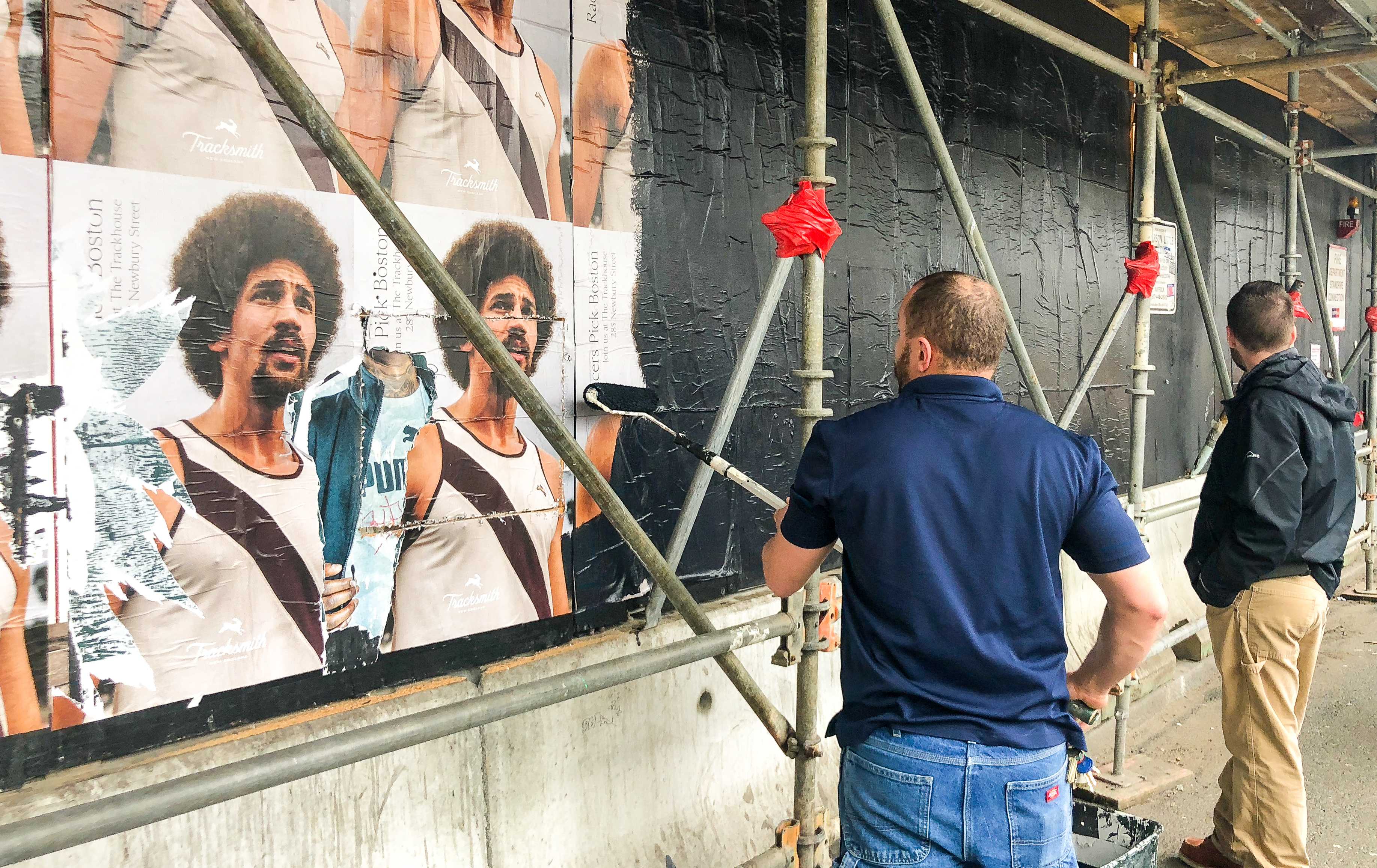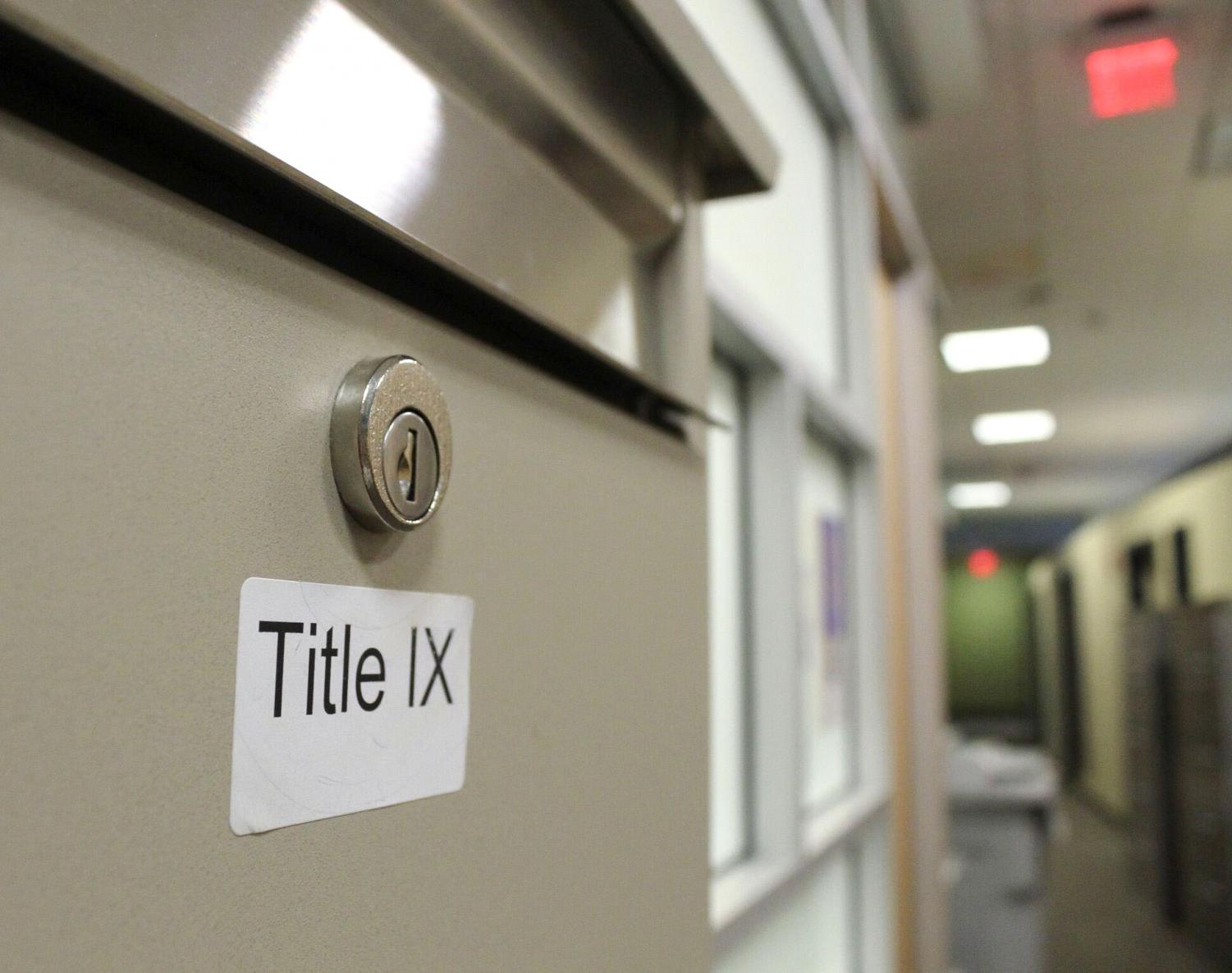Students who originally led the charge to get the college to review its Title IX policies are speaking out against a report containing recommendations released Wednesday by the Title IX working group, saying that the administration is dragging their feet.
Leah Cedeño, president of Students Supporting Survivors—an activist organization focused on empowering survivors of sexual misconduct at Emerson—and a former member of the working group, said the draft of the report confirmed concerns she’s felt about the group since its inception last year. The working group was created by President M. Lee Pelton in summer 2019 in response to a series of incidents where students publicly accused the college of mishandling Title IX cases.
While Cedeño said there were some positive aspects about the recommendations, they mischaracterized multiple issues and almost completely ignored what student advocates have pushed for since the spring 2019 semester, she said.
The group began meeting in mid-September 2019 and Cedeño said she attended about 11 meetings in the fall semester and missed two because of scheduling issues.
Several members of the group expressed confidence with the report and pointed to the intricacies and uniqueness of the college as to why they believe this was the best method to pursue change. Kaitlyn Bryson, a student in the group, said she believes their work is valuable because everyone on it is part of the community.
“Emerson is such a unique atmosphere that I don’t think any Title IX expert that has been outsourced could fully understand,” she said. “Having a bunch of people that don’t understand the unique culture that is Emerson come in, I don’t think that would be beneficial. It’s all about the different perspectives around the table and I think we did a really good job of getting those perspectives.”
The recommendations pushed for several big changes, including the creation of a standing committee to continually review and develop Title IX policies. The findings also leave the door open for the college to separate the Title IX office from the Social Justice Center and to create more resources for those accused of sexual assault.
“The amount of knowledge and education you need to have on this topic in order to make decisions regarding it is far more than anyone in that working group has,” Cedeño said. “Passing [our concerns] off to another committee leads to it taking more time, and I think the college would really like it if this took as long as possible, so that eventually they can silently just drop it.”

Leah Cedeño, President of S3 and former working group member, heavily criticized the group in her resignation letter and later denounced the drafted report that came out Wednesday.
She resigned from the working group in January, calling it “fundamentally flawed” and “designed to filibuster the time of Emerson students who are invested in this issue, outwardly performing action without the goal of any serious inquiry or systemic change,” in a scathing letter posted on S3’s website. The working group continued to meet throughout the spring semester after Cedeño left.
“It is meaningless forms of activism that I don’t really think does anything,” she said, referencing the working group and the report. “I think it makes the college look good. They can say that they did something. . . but if you look into the fine details they’re really not doing anything.”
Pelton did not respond to multiple requests for an interview, saying that he would not speak publicly on the report until the comment period concludes in June. Instead, a spokesperson for the college sent a statement to The Beacon saying that Pelton had no part in drafting the working group’s recommendations.
“President Pelton has full confidence in the group’s work and looks forward to feedback from the greater Emerson community,” she said.
The working group’s investigation comes amid nation-wide speculation about when new federal Title IX policies proposed by Secretary of Education Betsy DeVos will be enacted. The proposed federal regulations would make sweeping changes to Title IX policy and give more rights to those accused of sexual misconduct. Emerson’s working group was instructed to take the proposed changes and the likely final regulations into consideration when making their recommendations.
The working group is composed of 10 staff, faculty, and students. They were charged with reviewing the entire Title IX and sexual misconduct reporting and policy structure at the college, a vast and complicated procedure to understand.
They were responsible for completing their work and submitting their findings, along with a final list of recommendations, to Pelton by April 2020, giving them one academic year to review and solicit feedback from the community. The group slowed their timeline after the COVID-19 pandemic forced collegiate operations to move online.
The community has until June 5 to give feedback through an online response form. Members of the working group also plan to hold an in-person town hall in the fall before finalizing their recommendations and sending them to Pelton, stretching the process five months past original plans.
The group does not have any power to change college policy and are only compiling a list of recommendations to present to Pelton, who has the power to implement them.
The college first posted the drafted recommendations on a third-party website, making it inaccessible to anyone without an Emerson ID and password. The third-party system did not allow for downloading and it blocked online accessibility tools. The working group’s report directly advocates for more accessibility surrounding Title IX policy.
Emerson later posted a version of the draft recommendations on their website which permits online accessibility tools, however, users still need to login with Emerson credentials.
Co-Chair of the group Jan Roberts-Breslin wrote in a statement to The Beacon that it’s important for the community to keep in mind that the report is only a draft.
“We hope the community will read it carefully and comment thoughtfully,” she said. “The Working Group will consider the feedback and discuss it at the Open Forum. The draft will be revised, based on that feedback, before the final recommendation is made to President [Pelton].”

Workers painted over the scaffolding in front of Little Building where over over 12 students were publicly accused of sexual assault.
Pelton put the group together after an unknown number of students publicly accused 12 students of sexual misconduct, without publicizing evidence. A list of names appeared on the side of Boylston Street scaffolding in April 2019 and ignited a firestorm after pictures of the names circulated on social media.
The appearance of the list came on the heels of an impromptu gathering of over 100 students on campus to discuss numerous complaints that the college mishandles cases of sexual misconduct and what they see as a culture that enables and protects those who commit sexual assault. Cedeño helped organize the gathering and met with college administrators in the following days to discuss their concerns. In these meetings, Cedeño said she explicitly told Pelton that she didn’t want the working group.
Cedeño formed Students Supporting Survivors in summer 2019 with several other students who are advocates for survivors of sexual misconduct.
Title IX reports have been on an upward trajectory over the past four years. There were 90 reported instances of sexual misconduct during the 2018-2019 academic year which is up from 70 during the 2016-2017 academic year. There were 85 reports from the 2019-2020 academic year where students were sent home half-way through the spring semester due to the COVID-19 pandemic.
One of the most significant components of the drafted recommendations is the creation of a standing committee chaired by the vice president of the Social Justice Center, the vice president of Campus Life, and the vice president of Academic Affairs. They would be joined by representatives from different departments that have a place in the Title IX process like the Healing and Advocacy Collective, Student Conduct, ECPD, General Counsel, chairs of the Sanctions Panel, and Residence Life, along with staff from the Title IX office.
The committee would be required to meet at least once a month and would be tasked with over 12 charges that include creating a participation policy for seniors’ commencement, conducting a review of the college’s procedures every three years, and developing a training program for the entire community, fitting it to students at different stages of their education.
“The Standing Committee will strengthen communication and cross-office collaboration with an eye to improving student experience,” the report states.
During meetings with administrators in the spring, Cedeño said students brought up concerns about the lack of a defined policy for participation in student organizations and commencement should a student be accused of sexual assault, and a definition of the “need to know” policy. This policy determines who can access details about ongoing and past Title IX investigations.
Both Cedeño and S3 member Alice Dettmer said all of these complaints seem to have been given to the standing committee when they should’ve been addressed by the working group.
“I just don’t understand how it takes you two semesters to come up with a list that I could have given you,” Cedeño said, explaining her frustration with the report. “The fact that they’re focused on none of the ideas that we brought up is very telling, and I would urge other students to really read into that and see what that says about what the college really does care about.”

Alice Dettmer is a member of S3 and echoed Cedeño’s criticisms of the working group’s report, saying that it does not attempt to seriously address students’ concerns. Photo courtesy of Alice Dettmer.
The report also recommends that the college remove the Title IX office from the Social Justice Center. It states that the Title IX office does not appear neutral because it is located within the SJC which takes an advocacy stance and considers the historical context of systemic patterns of inequity. It further suggests that the relationship between Title IX and the SJC is problematic.
“Removing the Title IX office from the Social Justice Center will create the distance necessary to fulfill the neutral role that is expected,” the report states.
Co-Chair of the working group Amy Ansell said Title IX cases have to be examined individually, and questioned the role of social justice in that process.
“On a social, political level, it’s important to see that treating people the same isn’t necessarily in the service of equality or equity but in this particular domain with Title IX, it’s important that comparable resources are given to any student as part of due process until the time that a finding is made,” she said in an interview prior to the report’s release. “Title IX by necessity deals with an individual and ensuring due process for individuals involved, and those two things don’t always rub up and align in a way we might want.”
Cedeño said the position of the Title IX office has never been an issue brought up by students on campus, as far as she knows. Dettmer said instances of sexual misconduct are often rooted in power-based violence and can’t be separated from the wider culture of inequity in the country.
“A lot of the time, these cases have to do with power-based interpersonal violence, and often gender-based, power-based interpersonal violence,” Dettmer said in an interview. “Even though that happens on an individual basis, it happens within the confines of a political structure. So moving the office so that, theoretically, it would only be examining this on a case-by-case basis as opposed to looking additionally at the broader, power-based context of that just doesn’t seem to make a lot of sense.”
The report also states that there are clearly defined and established resources for complainants—those who file sexual misconduct reports—but not well-defined resources for respondents—those accused of sexual misconduct.
Cedeño voiced concerns in her resignation letter, writing that the group would be advocating to increase resources for respondents.
“How do you think survivors are going to feel when they find out there’s an on-campus resource for their abusers, when you’re not taking care of survivors at all?” she said in an interview before the draft was published. “In a lot of cases, respondents come from places of privilege, and that is often widely ignored.”
Ansell said there is already a robust system in place to support survivors of sexual assault, but there isn’t a similar system that is specific to respondents.
Support independent journalismYour gift helps to pay for The Beacon’s independent, investigative reporting. Join our community of members who believe in the fearless pursuit of truth.
In the current Title IX structure, respondents have access to the same resources as other students: an advisor for their case, ECAPS, academic counseling, and Student Accessibility Services. Survivors can additionally seek help from the Healing and Advocacy Collective which will not assist those accused of sexual misconduct.
Cedeño said the report’s shift toward respondents’ rights makes her concerned about the direction the college might take with future actions.
“It leads me to believe that they’re going to be putting energy into creating resources for respondents when that just isn’t necessary,” she said. “It’s an issue they’ve created out of thin air that no one has been complaining about.”
In a statement to The Beacon after the report’s release on Wednesday, Vice President for Equity and Social Justice Sylvia Spears said the findings and recommendations of the working group have significant implications for the Emerson community, the SJC staff, and the staff of the Title IX office.
“Given the complexity of issues involved in these findings and recommendations, it is my hope that those providing comments on the report as well as those who will serve as decision makers for the [working group’s] recommendations will base their conclusions and decisions on complete information, trauma-informed approaches, and evidence-based best practices,” she said.
In an interview prior to the draft’s release, Ansell and Roberts-Breslin said the working group also had to consider the proposed changes to the federal Title IX policy from the U.S. Secretary of Education Betsy DeVos during their review.
The proposed federal changes would redefine sexual harassment as “unwelcome conduct on the basis of sex that is so severe, pervasive, and objectively offensive” that it interrupts someone’s access to education or related activities. President Barack Obama’s administration defined sexual harassment as unwelcome conduct including unwanted verbal, nonverbal, or physical advances of a sexual nature.
If DeVos’s proposed changes are approved, colleges will also be required to set a higher and more rigorous standard of proof when evaluating claims of sexual harassment. Under Obama’s administration, a party only needed their allegations to have a 50 percent or greater chance of certainty. The proposed changes would also give those representing students accused of misconduct the right to cross-examine the accuser.
These changes have been rumored to be coming for over a year.
The working group’s report, following a trend set by the federal government under the proposed changes, leaves the door open to provide more resources for those accused of sexual misconduct.
Bryson, one of the other students in the working group, said that while those in the committee are not lawyers, they have to keep in mind the possible regulation changes when considering their recommendations to Pelton.
“It’s tough, because we’re learning this law, but any moment it could change,” the senior public relations major said. “All universities, including Emerson, are in a really tricky, limbo-land position. We want to do so much but at the end of the day, we have to adhere to federal law.”
Before the drafted report was released, Cedeño told The Beacon she’s always believed the group would not propose any policy shifts that could benefit the student body.
None of its members, she said, have extensive training with Title IX policy or the investigation process. In the first meeting of the working group, some of the members openly called the group a learning experience, Cedeño said. No staff members from the Title IX office, the Social Justice Center, or the Healing and Advocacy Center were placed in the group.
“A committee should not be a learning experience,” she said. “We’re going to go from not knowing anything in September, and then at the end of the spring we’re going to have all of these recommendations to make? That’s ridiculous.”
The group was given three legal consultants, chosen by Pelton and General Counsel Christine Hughes, to educate them on Title IX federal and college policy. The consultants are Melissa Carleton and Josh Nolan, both Title IX lawyers and investigators from Bricker & Eckler, and Joe DiChristina, dean of campus life and vice president of student affairs at Trinity College.
Cedeño said the consultants were not enough to provide the working group with the expertise to effectively tackle the issue.
“I just saw it, and I still see it, as a bone that was thrown to us to get us to be quiet so they can say that they did something,” she said, referencing the creation of the working group. “That’s not the fault of anyone in [the group]. It’s the fault of the people who are assembling the group, purposefully with none of [the experts] in the room.”
Ansell and Roberts-Breslin said the consultants were most heavily involved during the first semester and only utilized in the second semester when the group had questions. The consultants had no say in the recommendations, but were only a resource for the group, Roberts-Breslin said.
Ansell said the group still relied on staff from the Title IX, SJC, and HAC departments to answer any questions.
During the spring semester, the group brought in representatives from the SJC, HAC, ECPD, Title IX, Student Life, and the college’s lawyers to talk about their role in the investigation process. The group would meet with them for around an hour, Ansell said, and then would correspond with them individually throughout the semester whenever they had questions.
“We’re looking at the ecosystem. It’s hard for someone who’s intimately involved in the daily aspect of this to see the broader picture from the outside,” Roberts-Breslin said in an interview.
Despite the fact that Roberts-Breslin and Ansell said it wasn’t appropriate for staff from the SJC, HAC, and the Title IX office to participate in the working group’s review of the college’s sexual misconduct policies, they did include them in the standing committee that will be reviewing the same policies every three years.
Roberts-Breslin said it also didn’t make sense to bring in outside consultants to do the work of the group and make the recommendations.
“It’s not an external compliance review,” she said. “It’s a [review] as representative members of this community on how this process works and resonates within our community, and I think we’re a perfect group to be speaking for the community.”

The Title IX office has undergone at least three reviews over the past 10 years.
The most recent external review of the college’s Title IX policy was in 2014, several months after three students filed federal complaints with the Office of Civil Rights, claiming Emerson mishandled their sexual assault cases. The complaints are still being investigated by the OCR.
Margolis Healy & Associates, a Vermont-based group that specializes in campus safety, security, and regulatory compliance, was hired in November 2013 to assess the college’s policies with Spears serving as the liaison between the college and consultants.
Spears declined to comment on the 2014 review.
Consultants from Margolis Healy & Associates held several forums in 2014 with students, faculty, and staff about the college’s handling of Title IX cases. Out of this review came the current sexual misconduct policy, along with the establishment of HAC and the model for a Title IX office.
Cedeño said the current working group and her dealings with administrators, including Pelton, has made her believe that there is a pattern in the college’s handling of Title IX where the college only acts on complaints about policy when students publicly speak out.
“It keeps happening and it’s at a point where [I know] this isn’t a mistake, they’re not stupid,” she said. “They run a college, they know what they’re doing . . . It’s just a cycle and it keeps happening, and they don’t care about breaking it because once we’re gone, that’s an opportunity for them to forget about it and not talk about it anymore.”
Bryson said she wished students would consider the time it takes to review and make changes to the policy.
“I understand that immediacy, and feeling like if things aren’t now then they’re not happening at all, but I would really urge students to think about the bigger picture because I think that’s what’s really important,” she said in an interview. “I think that’s something that students often don’t put into perspective. If we want to do this right, it’s going to take time, and it’s going to take a collaborative effort.”
The college also reviewed Title IX policy in 2016 and proposed changes in 2018. Cedeño expressed frustration in her resignation letter that the working group was not looking at the already-proposed changes.
General Counsel Christine Hughes told The Beacon in April 2019 that the college is choosing to wait until the Department of Education issues final guidance on Title IX before considering the 2018 recommended changes.
Hughes did not respond to repeated requests for comment on whether this is still the case.
Ansell and Roberts-Breslin said the working group began to look at the 2018 revisions during the spring semester after Cedeño resigned, but said they are not substantial changes to policy. The recommendations were mostly about making the policy language more accessible and easy to read, they said.
Title IX Coordinator Pamela White and Hughes previously told The Beacon they could not discuss the Title IX office’s 2018 proposed revisions before a separate policy committee reviews them.
White did not respond to requests for an interview.
The 2018 proposed revisions were not mentioned in the draft of the recommendations.
Bryson said that when someone is sexually assaulted, they often want justice which can turn into frustration.
“But they find that even if someone is sanctioned or no longer at school, that pain doesn’t go away,” she said. “I think a lot of the time there’s a lot of frustration that is misdirected and there’s only so much that a Title IX process can do for someone who’s been severely violated and that’s hard to recognize when you’re in a lot of pain.”
Both Cedeño and Dettmer said the past year has drastically changed how they view Emerson as an institution.
“I just can’t believe the college is doing half the stuff it’s doing, regarding this issue,” Cedeño said. “I always had this idea that Emerson was so liberal and cared about their students. And then to get here and be face to face with administrators in these meetings feeling like they don’t respect or care about me as a person and don’t respect or care about students going through this has really shifted the way I view the college in such a drastic way—and it happened within six months.”
Stephanie Purifoy can be reached at [email protected].
Correction 5/4: A previous version of this article incorrectly stated that the working group met 13 times in the fall semester. This has been corrected. We regret this error.